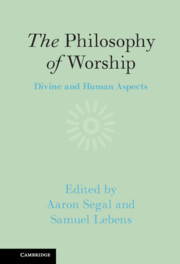Book contents
- The Philosophy of Worship
- The Philosophy of Worship
- Copyright page
- Contents
- Contributors
- Part I Two Introductions
- Part II What Is Worship?
- Part III Normative Aspects
- Part IV Forms and Functions of Worship
- 13 Liturgical Philosophy of Religion
- 14 Maimonides on Worship, True and False
- 15 The Individual’s Relationship with God
- 16 The Metaphysics of Divine Presence and the Appropriateness of Worship
- Index
- References
13 - Liturgical Philosophy of Religion
An Untimely Manifesto about Sincerity, Belief, Acceptance, and Hope
from Part IV - Forms and Functions of Worship
Published online by Cambridge University Press: 09 January 2025
- The Philosophy of Worship
- The Philosophy of Worship
- Copyright page
- Contents
- Contributors
- Part I Two Introductions
- Part II What Is Worship?
- Part III Normative Aspects
- Part IV Forms and Functions of Worship
- 13 Liturgical Philosophy of Religion
- 14 Maimonides on Worship, True and False
- 15 The Individual’s Relationship with God
- 16 The Metaphysics of Divine Presence and the Appropriateness of Worship
- Index
- References
Summary
This loosely argued manifesto contains some suggestions regarding what the philosophy of religion might become in the twenty-first century. It was written for a brainstorming workshop over a decade ago, and some of the recommendations and predictions it contains have already been partly actualized (that’s why it is now a bit "untimely"). The goal is to sketch three aspects of a salutary “liturgical turn” in philosophy of religion. (Note: “liturgy” here refers very broadly to communal religious service and experience generally, not anything specifically “high church.”) The first involves the attitudes that characterize what I call the “liturgical stance" towards various doctrines. The second focuses on the “vested” propositional objects of those attitudes. The third looks at how those doctrines are represented, evoked, and embodied in liturgical contexts. My untimely rallying-cry is that younger philosophers of religion might do well to set aside debates regarding knowledge and justified belief, just as their elders set aside debates regarding religious language. When we set aside knowledge in this way, we make room for discussions of faith that in turn shed light on neglected but philosophically interesting aspects of lived religious practice.
- Type
- Chapter
- Information
- The Philosophy of WorshipDivine and Human Aspects, pp. 229 - 254Publisher: Cambridge University PressPrint publication year: 2025

